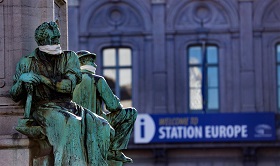Covid-19, demonstrations in Khabarovsk, Alexey Navalny’s poisoning, protests in Belarus, revived conflict in Nagorno-Karabakh, political crisis in Kyrgyzstan: Russia is facing a number of challenges internally and in its immediate neighbourhood. Andrey Kortunov, Director of the Russian International Affairs Council (RIAC), shares his analysis of President Putin’s situation amid these crises, and of Russia’s relations with Turkey and the EU.
Covid-19, demonstrations in Khabarovsk, Alexey Navalny’s poisoning, protests in Belarus, revived conflict in Nagorno-Karabakh, political crisis in Kyrgyzstan: Russia is facing a number of challenges internally and in its immediate neighbourhood. Andrey Kortunov, Director of the Russian International Affairs Council (RIAC), shares his analysis of President Putin’s situation amid these crises, and of Russia’s relations with Turkey and the EU.
What does Vladimir Putin's current situation look like, amid the different crises Russia is facing at home and in its immediate neighborhood? Is he able to provide stability in the region?
Just a couple of months ago, Vladimir Putin could feel quite confident about his position at home and abroad. He managed to navigate constitutional changes without triggering street protests or political infightings in or around the Kremlin. Russia seemed to handle the Covid-19 pandemic better than most of its Western neighbors. Global oil prices were gradually rising and earlier concerns about macroeconomic stability were gone. Moreover, there were hopes for a micro-détente with the West, in particular with Europe, and moderated expectations of progress in dealing with the Donbas conflict.
However, this image was shattered already in early fall. The second wave of the pandemic hit Russia hard in September and continuous demonstrations in the Far Eastern city of Khabarovsk set a dangerous precedent for a lasting large-scale public disobedience campaign. The Normandy Group summit was indefinitely postponed, since the Minsk agreements implementation process had run into yet another dead-end. The poisoning of Alexey Navalny cast a new shadow over relations between Russia and the West, particularly between Moscow, Berlin and Paris. President Macron’s long-awaited visit to Moscow never happened and Russian-German relations reached an all-time low. Finally, the Kremlin witnessed a chain of apparently unexpected crises along its borders — from Belarus to South Caucasus to Kyrgyzstan.
The immediate reaction to these developments has been slow and cautious. The Kremlin has demonstrated its commitment to the status-quo — be it in domestic politics or in foreign policy. The Kremlin is apparently playing for time, given all the uncertainties of the economic situation inside the country and the political turmoil around it. There might also be a shortage of new ideas partially caused by the disruption of interagency communication lines due to the pandemic.
Read the full interview at the Institut Montaigne website.





